'Shōgun' Actress Anna Sawai on Mariko’s Big Moment: ‘I Felt So Powerful’
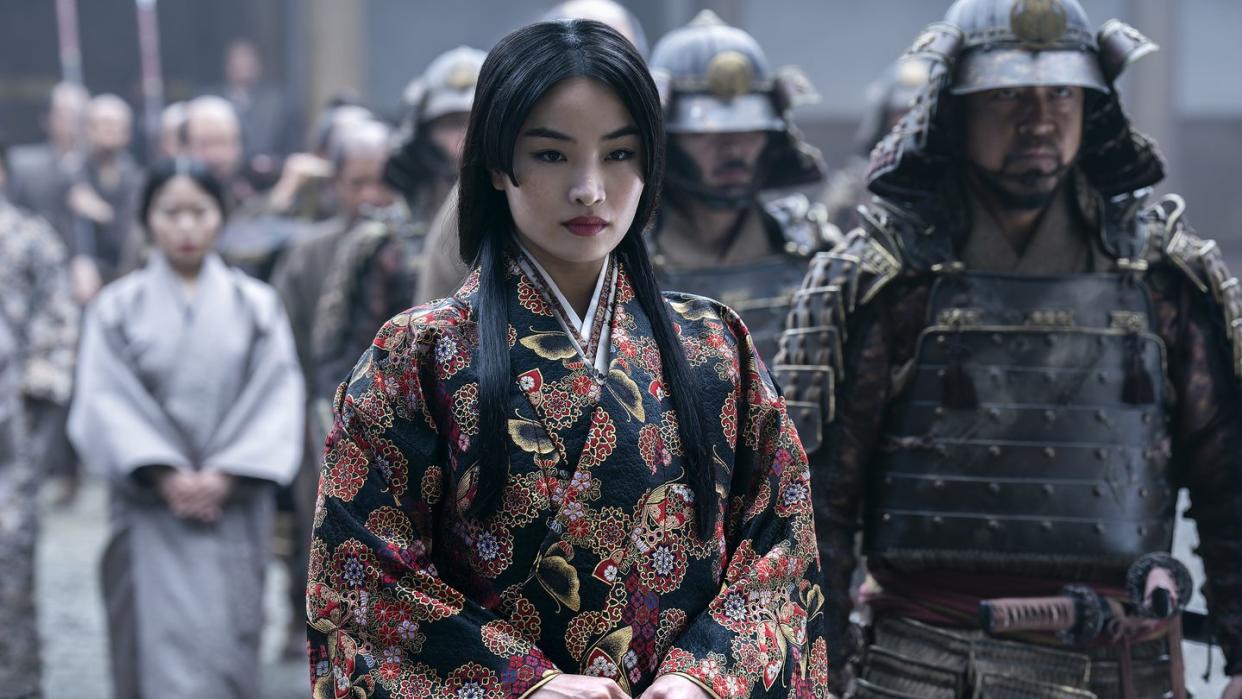
- Oops!Something went wrong.Please try again later.
Spoilers ahead for Shōgun.
Toda Mariko has been waiting years for this moment. Ever since her father was killed for treason, and their family executed as his punishment, she has yearned to follow in their footsteps and finish what they started. So when Lord Toranaga (Hiroyuki Sanada) asked if she was ready to do her part, no wonder she replied with an emphatic yes. What follows at Osaka Castle in Shōgun episode 9, “Crimson Sky,” is both inevitable and shocking.
Even Anna Sawai, who knew of her character’s fate when she joined the show (and after referencing James Clavell’s novel) knew what was coming, but “how it was going to be executed and how big of a scene of her leaving Osaka was going to be, I did not imagine,” she says via Zoom from Japan.
Mariko’s power has always been in her words, as she served as a translator for Toranaga (and, recently, flaunted her razor-sharp poetry skills). In “Crimson Sky,” her strength is on full display as she stands up to the Council of Regents who refuse to let her leave Osaka with Toranaga’s wives to escort them to Edo. But by triggering their refusal, she’s proving that they are keeping lords and ladies, much like herself, hostage in the castle. That would muddy the regents’ reputation and upset the public. “I will never be captured, hostage, or confined,” Mariko declares.
As the episode unfolds, her physical strength and the strength of her willpower will become evident as well. When blocked by guards at the castle gates, she fights nearly a dozen of them alone with her naginata. And when she doesn’t succeed, she proceeds to commit seppuku, a.k.a. ritual suicide, knowing that a highborn lady’s death in Osaka Castle would cause uproar. (As a Christian woman, she appoints Kiyama to “second her” to avoid committing the sin of murder. When he doesn’t show up, Blackthorne steps in.)
In the nick of time, Ishido gives her allowance to leave Osaka, but in the middle of the night, an army of Shinobi warriors attack. She and her group–including Yabushige, Blackthorne, and Toranaga’s consorts—are driven into a storage room with no way out. As Mariko hears the enemy lighting a fuse on the outside, she steps in front of the door and declares that she will give her life for a greater purpose after all. She dies in the explosion, completing her lifelong mission and knowing that her death will have greater consequences in an already fraught political climate.
Regarding Mariko’s position as a woman in a male-dominated society, Sawai says, “Just because she doesn’t have the actual voice to be able to say it, doesn’t mean that she doesn’t have her own destiny or she can’t make her own decisions.” The actress adds, “Her power is so much more subtle, but in a way even more powerful, because I do believe that the people who are not allowed [it] have more control, sometimes.”
The dramatic exit isn’t far from real-life events, either. The historical figure Hosokawa Gracia, on whom Mariko is based, similarly refused to be taken hostage by the warlord Ishida (the model for Ishido) at Osaka. It’s believed she committed seppuku in protest, having someone else complete the act for her.
Sawai, who delivers a career-defining performance, talks to ELLE.com about filming this pivotal episode, Mariko’s decision-making, and what the character taught her. She also takes a moment to reflect on Shōgun’s immense streaming success. “It’s so unreal. Truly. I feel like no one was really expecting it to be this well-received.” She adds of her home country: “The Japanese people are also watching and loving it.”
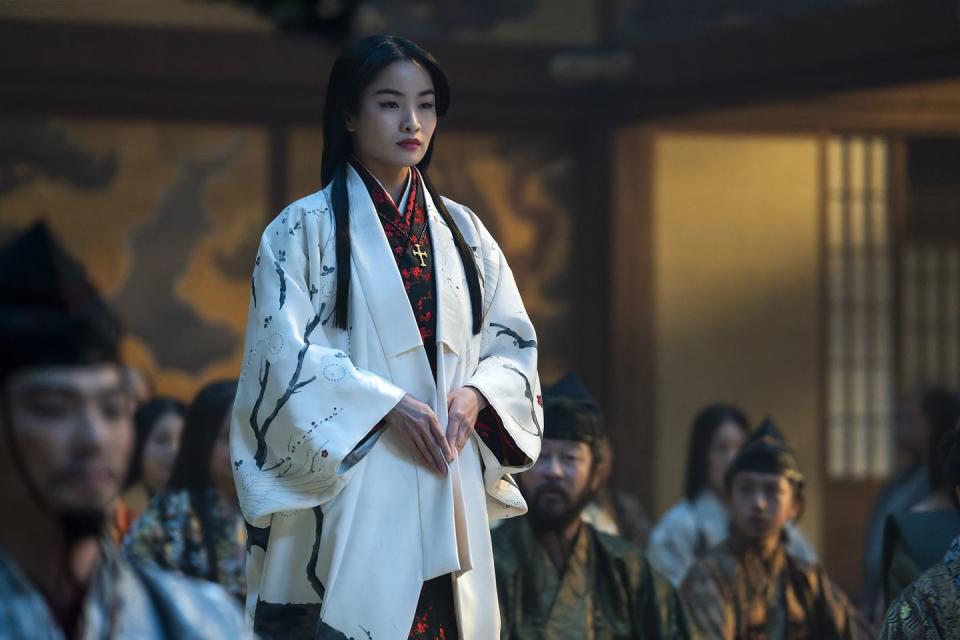
In a storyline that’s so dominated by men, Mariko maintains a very rare role as a woman who has power, whether it’s through intellect or through language. And in this episode, she shows how she’s really able to wield that. What do you make of her position?
I think that up until episode 9, she’s supposed to be concealing everything that she’s feeling, and she’s not allowed to really express any rebellion that she has. And episode 9 is the first time that she’s allowed to. So it was just a release of everything, and I felt so powerful physically as well, thanks to Lash [Lauro Chartrand-Del Valle, the stunt coordinator] and the choreography. But it was more so the mentality of it: This is what my life purpose is, and whether you stop me or not, I’m going to achieve this goal. And her goal is to serve her lord. I love that we get to see the realization that she has. In episode 8, we see that she understands what the other samurais have done to serve Toranaga-sama, and I think that is a very pivotal scene where it switches. She finally has clarity. So I was just channeling all of that.
The subtleties and nuances in your performance are really interesting. Did you feel compelled to exhibit some restraint, whether it was through your voice or mannerisms? With that kind of performance, the drama and the weight of Mariko’s words really stand out. Was it physically different for you?
I think most women will understand this, maybe not so much now, but we have definitely been in positions where we were kind of shunned. And especially as a Japanese woman, I feel that so much even today and when I was working in Japan. I’ve seen people go through that as well. I see that right now. So I didn’t really have to change too much. It was more like, Okay, so this is going to be a little bit more extreme, but it’s something that I already know and I see. I didn’t really have to do my research in order to get to that place. The men obviously go to battle to fight, but the women have their own battle, and that is still very much existing right now. And so it was like, I’m going to do this for these women.
The scene at the gate was so fascinating—the way the suspense builds, how more and more guards are revealed, the arrows falling at her feet. As the guards are fighting one another, I noticed that you didn’t move at all, and the chaos surrounded you. What was it like filming that sequence?
It was intense. I just remember really feeling like Mariko. I think she understands that she’s not going to die and they’re not going to kill her, but she’s trying to make a statement. And in order to make that statement, she knows that people, her warriors, are going to lose their lives. When she says to go kill them, I think she hides it well, but she’s seeing all these men just die. And then the last person bows to her and then gets [stabbed]. All of that really broke my heart, but at the same time, I need to get through this in order to have these people understand what she’s about to do. So it was a tough scene. Physically, yes, but more so mentally.
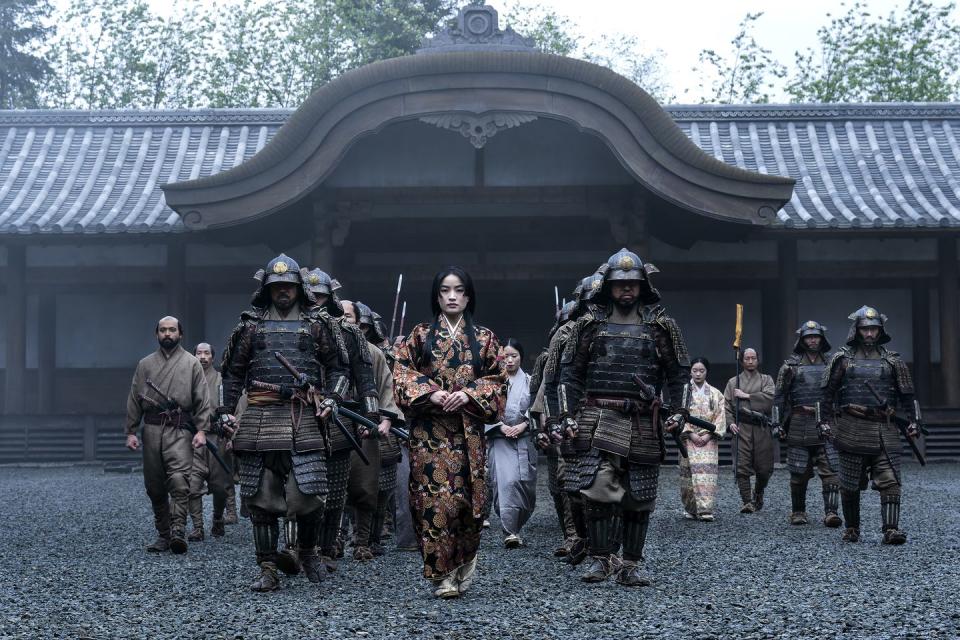
What kind of training did you do for the combat scenes?
We already had a lot of training prior to that scene. Before we started shooting, we were working with Lash and his team. I think by the time we were shooting episode 9, I had already known how to wield the naginata. I believe that we did the choreography for maybe two sessions. But we were shooting simultaneously, so we weren’t able to carve out enough time where we were working at a camp and preparing for a whole week. I’m sure the stunt guys were doing that, but I personally wasn’t able to do it as much.
I don’t think we were doing rehearsals on the same day that I was shooting, but I think we had full, long days of training. I think maybe a weekend or something.
That’s so impressive. I enjoyed the attention to detail in that fight scene too, when you can hear her voice being very strained and you can hear the exhaustion. How physically tiring was it for you?
Well, I think it should have been physically tiring, because I did have bruises on my knees and a chipped tooth the next day. But in the moment, I don’t think I was like, “Oh my God, I’m so tired.” It was more like, “I have to do this.” And one of the stunt guys was like, “I’m not going to step back if you don’t come more aggressively.” And I was like, “I’m just trying to be safe,” but he really was not going to [step back]. I was like, “Damn it, I’m going to really attack!” That kind of put on the switch for me. And it looked amazing. I’m sure that everyone was also just in their characters doing it.
That scene is very integral, because it helps Mariko make her pivotal decision that she will make the ultimate sacrifice. What is the importance of that decision to her? How does it tie into her purpose in life?
I think it’s everything, because that’s what her father wanted for her. She’s lived the last 15 years of her life wishing that she could have followed her family. And only recently does she figure out that her father wanted her to live so that she could finish what he couldn’t achieve. I think the realization is just huge, that she gets to answer to her father, to her lord, and she gets to follow, finally, her family.
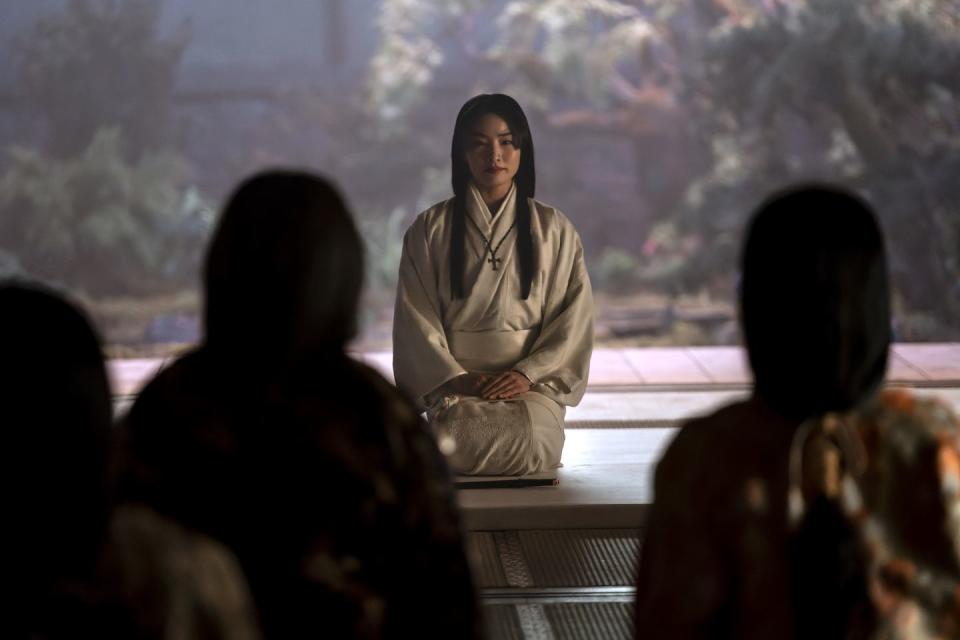
The scene when she’s about to commit seppuku feels like it’s choreographed—there’s some rigidity to it, but it was very emotional as well.
Yes, it is all choreographed properly. The way that you bring up the sword and the way that you flip it, everything was so specific. So we did rehearsals for just the actions, I think. But on the day, even though that isn’t the way that she dies, I think Mariko is going into it like, Yes, this is the last breath that I’m going to take. So it was very emotional, and I could see Mariko’s son sitting behind a corner...I didn’t even think about that before going on set, but just seeing him in my vision was like, my son has to watch me doing this, and I lost my family and I regretted it for the rest of my life that I couldn’t follow them, and now I’m putting my son in the same position. [There’s] a whole thing of just emotional regret, but also at the same time, this is what she has to do.
When Blackthorne steps in to second for Mariko because no one shows up, what does that gesture mean to her? Does that change their relationship, in your opinion?
I think he is a Christian, and so to behead someone is going against anything that you learn as a Christian. So when he steps up, I think that is love. I think this is also very difficult, because if she commits seppuku, then she is committing suicide, and she is a Catholic, so that is going against her religion. But if someone beheads her, then that means she is being killed, and that itself is not a sin. So it’s either it’s going to be her or Blackthorne, and he decides, “I don’t care about myself. I want you to have the right death.” So when he steps up, it’s as if she sees him. I mean, she already has love for him, but she really sees that he will put her over himself.
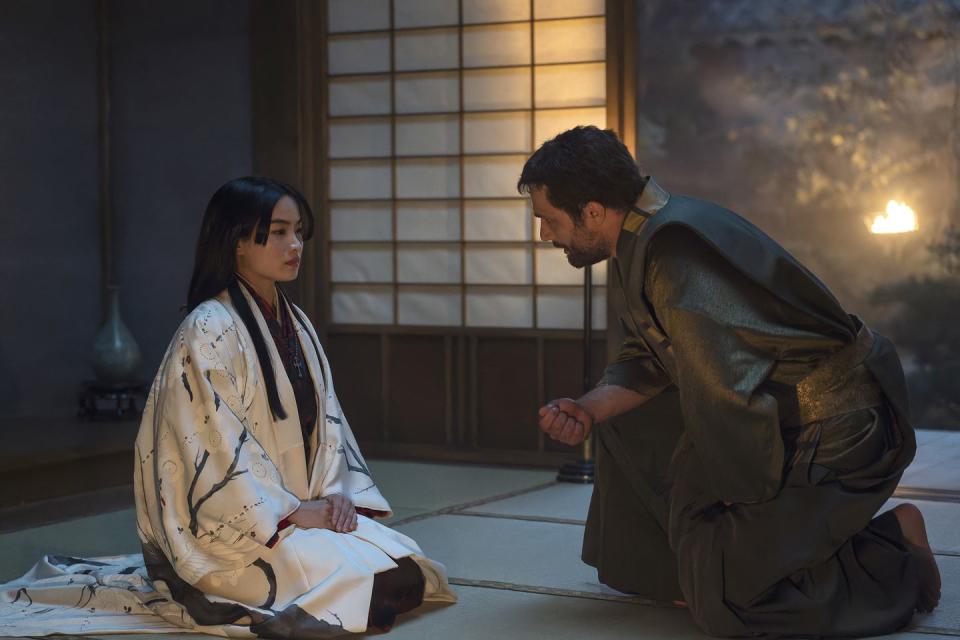
That was a very powerful scene. And it seems like there’s a sigh of relief after. She makes peace with the fact that she’s permitted to leave Osaka. But once there’s an attack, she and the others are basically cornered into a storeroom with no escape. Viewers finally see her and realize there’s another opportunity to fulfill a mission. Tell me about your thought process in that moment.
I think it would’ve been obviously peaceful if she tried to leave Osaka. She was denied it, and then now she is allowed and everyone gets freed. That would be a way to achieve it. But once they’re attacked, she realizes that either she’s just going to be taken and killed by their hands, or she can do that for herself. And she realizes that she does need to sacrifice her life in order to serve her lord. And she doesn’t have a whole 10 minutes to think about it. I think she understands that her death will mean something significant. It will change the way people view Ishido or everyone else. It’s a very quick decision, but she realizes how meaningful it will be.
She knows the value of her life and how she could create political influence, knowing that people will be mad if she’s killed.
She understands that Japanese people really do try to find their purpose in life. We see it in people like Uejirou, the gardener, who is very low-rank, but also serves a big purpose when he dies. And so it’s not just [life] that is purposeful, but she understands that death could be very, very meaningful. I think that’s why that’s an option for her.
Let’s talk about that last scene in the storeroom. I heard that you filmed the explosion scene on your birthday.
It was my birthday! That scene was shot over two different days. The first day was my birthday. And we were using a Phantom camera, which is very slow, and I’m so serious and ready to give my performance. And then they’re all like, “Happy birthday!”
But it was strange...we had this whole scene where it was just the door and Mariko, and she says her last final line to Blackthorne, and then she runs over to the door. And then on a different day, we did the whole scene where we’re going into the storeroom with the other cast. So it was very interesting approaching it from three very different angles. But I think that maybe getting that time to explore one short scene was great for me, because it was going to be the final moment. And she is going through so much. On one hand, she’s saying goodbye to Blackthorne, but on the other hand, she’s trying to make a full statement to Japanese [people], to the five lords. We really took our time shooting that scene.
Is there anything in particular you’ll miss about Mariko? What did you take away from this character?
I think I already miss her, but I did leave set over a year and a half ago. There’s so much that I took away from her. I think that I appreciate Japanese culture and Japanese women’s mentality so much more. And although I do see some flaws in that, and I still see Japanese people, women struggling because of that, understanding both, I think, will hopefully allow me to switch on and off when it’s needed. I also have so much love for the team. I truly found a whole different family in Justin [Marks], Rachel [Kondo], Hiro [Sanada], Eriko [Miyagawa], and everyone who was involved. In a way, it’s making my career a little more difficult, because now I have to find a better team, if not the same [caliber]. It’s fed me so much, and I already miss it a lot.
This interview has been edited and condensed.
You Might Also Like

